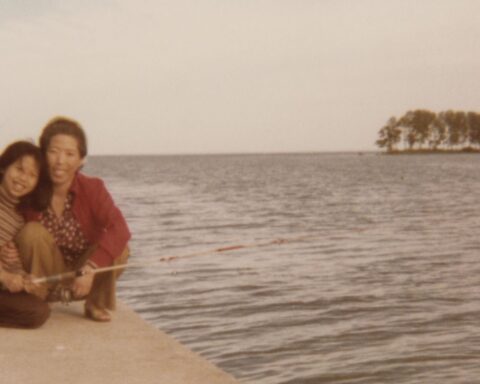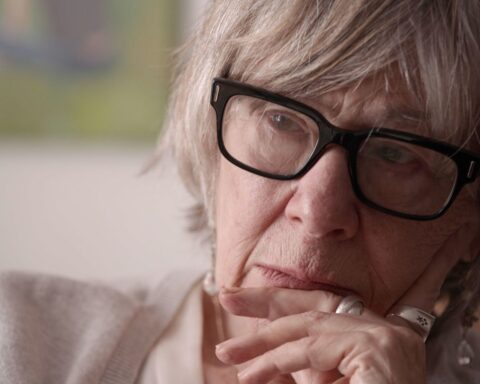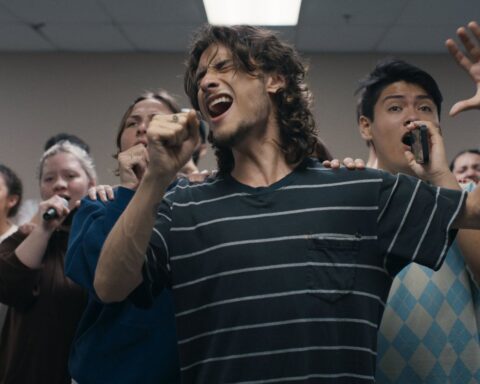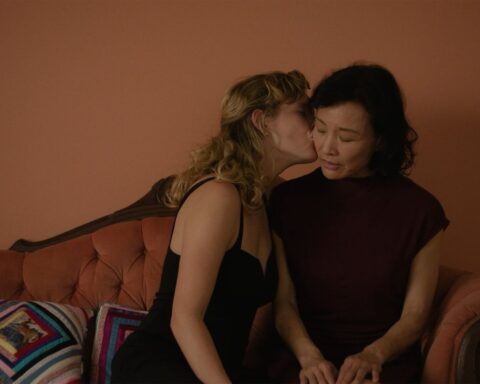After two years of tumult, things are finally settling down at the CBC’s flagship science strand, The Nature of Things (TNOT). Or are they? While it seems to be working for Canada’s famed mother Corporation, how do the country’s independent documentary producers feel about the changes in the venerable series?
The Nature of Things commissions Canadian independent filmmakers and production companies to make science documentaries, which air as a collection of stand-alone episodes. Typically, the anthology series premieres new films each week on a wide range of topics, blending cutting-edge research with human-interest storytelling.
In 2022, long-serving host David Suzuki announced his retirement from the series, stepping down the following year at the age of eighty-seven, after forty-four years as the face and voice of the strand.

He wasn’t the show’s first host, having been preceded by Donald Ivey, Patterson Hume and various guest presenters, but Suzuki had become associated with the brand in the minds of Canadians. The word “iconic,” overused in the entertainment industry, is in this instance no overstatement.
Replacing him was expected to be no small task, but within months the CBC announced that it had lined up the perfect successors: Suzuki’s daughter Sarika Cullis-Suzuki, a marine biologist and environmentalist, and molecular scientist Anthony Morgan, an experienced doc host and creative director of education-focused start-up Science Everywhere.

The duo were introduced to industry producers at Hot Docs 2024 during a session hosted by Lesley Birchard, CBC Docs’ then-executive in charge of production. TNOT pitches, Birchard explained, must align with one of the show’s four main content pillars: animals; lost worlds; climate change and the environment; and the human body and brain. Birchard added that the plan was for Morgan and Cullis-Suzuki to typically host around two-thirds of a season’s episodes since, as she joked, “We can only jet Anthony and Sarika to so many places.”
This January the strand received another major personnel shake-up. Sue Dando, TNOT’s executive in charge of production, announced that she would be retiring from the CBC after thirty-eight years with the Corporation. Following the news, Birchard was appointed TNOT’s new executive in charge of production, with Lucius Dechausay taking her previous role as executive in charge of production for CBC Docs.
The one-two punch of Suzuki and Dando’s departures forced the CBC to feint away from a potential pummelling and come out swinging. After Morgan and Cullis-Suzuki successfully broadcast their initial season as hosts, POV spoke to a number of Canadian producers who have made films for TNOT to gauge their views on the new format.
Scott Harper, a Toronto-based director and founder of indie production company Sunday Night Entertainment, is among the filmmakers who has made docs for the science series under both the old and new models. He made titles such as 2014’s The Secret Life of Pigeons and 2018’s Spying on Animals with David Suzuki, as well as Teenager: The Science of Adolescence, which aired this January and was hosted by Sarika Cullis-Suzuki.
Teenager explores the neuroscience of adolescence, revealing how teenage brains of both humans and animals are wired for risk, reward and transformation. It was commissioned in 2022 “right at the change point” between the hosts, Harper recalls. At that year’s World Congress of Science and Factual Producers gathering in Edinburgh, Dando confirmed that the doc would be getting a greenlight on the condition that one of Cullis-Suzuki or Morgan would be attached.
“She said, ‘we’re going to do this, but they’re going to be the hosts, so think about how you want to use them.’ And then we were in production within a year of having pitched,” recalls Harper. The approach proved a significant change in style from past installments for the strand—but, for him, a welcome one. “With David, sometimes you’d get him out and about shooting some inserts, or something kind of fun and playful off the top. But for the most part, you weren’t building the project with a host being involved in every act.”
With Cullis-Suzuki and Morgan, however, “you have to find ways to weave them into the material,” Harper explains. “And with the extent to which you have them available, you can obviously produce some very creative scenes and have them fully embedded in the science. So, it’s actually an opportunity to play with this format that’s been around for a long time—to inject some new energy into it. And of course, they’re both whip smart and keen to make it work.”

The film was also commissioned by the broadcaster “around the time when it was becoming quite obvious that [the CBC] did want other broadcasters to be involved as co-producers,” Harper recalls. However, in the case of Teenager, international financing was not required. ARTE acquired the finished doc for broadcast in France (deciding to keep the host in the doc), “but it was commissioned solely by the CBC,” Harper says. “We effectively funded through them and the usual suspects: [the Canada Media Fund], tax credits and so forth.”
He acknowledges, however, that it is becoming increasingly difficult to realize future projects without international partners onboard from the outset. “I think everybody realizes that one broadcaster is not going to cut it now,” he says. “Maybe if you’re National Geographic or the BBC, but for the rest of the players, it seems increasingly necessary to have a few other partners… and earlier in the process, rather than later.”
Such thinking is currently at play as Harper develops an as-yet-untitled documentary about the social lives of hyenas. “You’re wise to think, is there a way to shoot this and cut it without [the hosts], because maybe a Finnish broadcaster or a Middle Eastern broadcaster is not going to want to see English-speaking hosts in their show.” But while Harper is remaining upbeat and making it work, not everyone has warmed to the new model.

Several Canadian filmmakers voiced private criticism to POV. One independent producer, who has made films for the strand but requested anonymity owing to their ongoing relationship with the CBC, said the new model has effectively been thrust upon indie filmmakers without consultation. In the past, they explained, “independent producers would pitch films, and they would get packaged lightly by The Nature of Things in order to be part of that show. But you’d be left with a product that you could un-package really easily and then sell internationally as an independent film.
“You’d write a narration track that Suzuki would read. But he’d never be with you on set,” they pointed out. “He would have no on-camera visibility of any kind… [you] would have him do an upfront at the beginning, and then maybe you’d see him again at the end. But you could cut that, right? So, if you’re selling it to France, you just say, ‘here’s the narration in English, get somebody to do it in French.’ Cut the beginning and the end, you’ve got an independent film.”
But the new, integrated model, they say, has received a cool reception from international buyers. “When we go to international marketplaces and talk to people, they say, ‘It’s such a shame what happened with The Nature of Things. Are they going to go back to the old models so that we can work with you again?’”
The lack of international interest in the new hosts is not the only bugbear. Adding on-screen talent to nature docs drives costs up, which have to be shouldered by the production company, according to the producer.
“You’ve got to double-shoot every single scene,” they say. The result is an increase in budget by approximately 1.3x to 1.5x the cost of a hostless version. “You’ve also got to hire two editors to cut for long periods of time. And you’ve got to pay the new hosts day rates and their ACTRA fees; I’ve got to now add a member of my crew who’s going to fly everywhere with me and stay in all the hotels… but I’ve got to double-shoot every scene they’re in. And all of that burden falls on the independent producer.”
For its part, the CBC insists that it is factoring in these costs with its overall budgets and its increased focus on international coproduction.
“A successful strategy has been to encourage international coproductions in which a version of the film is made for the international market as well as a version made specifically for The Nature of Things (usually featuring one of our hosts),” says Sandra Kleinfeld, the CBC’s senior director of documentary, responding to POV’s questions via email. “These projects are creative and financial collaborations between the Canadian filmmaker and an international partner. And—importantly—the partnership means a higher budget so that both sides benefit from great production values as well as broadcasting their own version.
“These are working remarkably well,” she adds. “A show like Mystery of the Walking Whale, for example, did well for CBC and also for our partners, NOVA on PBS and NHK in Japan. Sarika Cullis-Suzuki hosted the version for TNOT while the US and Japan did not have a host. Foodspiracy, with the BBC, is another successful example: both TNOT hosts took part in the CBC version. And the three-parter Secret World of Sound was a wonderful collaboration that recently won an Emmy.”
But the anonymous producer says this has not been their experience when approaching international networks. “They don’t want to be the first in,” the producer says. “If you go to ARTE or ABC or any of those erstwhile partners, they’re saying, ‘We’re not going to be first in because you’re going to make this show with these hosts.’”
Kleinfeld notes that “any additional costs to include a host are always part of the overall budget and licence fee,” but it is clear there is some discord with the filmmaking community. “It’s always been challenging for filmmakers to fund documentaries,” Kleinfeld says. “It’s very competitive, and we hear consistently that it’s more difficult right now. So, we’re making it a priority to collaborate closely with them on how to make things work—whether that’s with international coproductions or other creative solutions. And by expanding our digital content offering with The Nature of Things 101, we’ve opened the doors to filmmakers who might not have had a chance to work with us otherwise. Recently, the feedback from filmmakers is that they’re feeling more hopeful and more open to creative collaborations.”

The Canadian independent documentary community is taking different approaches in their search for a solution to creating films that work for TNOT and international broadcasters. Montreal-based Galafilm Productions recently produced two docs for TNOT: The Secret Knowledge of Animals, a Germany-Canada co-production, and Implosion: The Titanic Sub Disaster, an international co-production made with the BBC, Discovery and ZDF. The former aired in February and the latter aired in June, with neither co-production featuring the CBC’s hosts—an indication, perhaps, that bigger co-productions not originating from Canadian funding will be unlikely to incorporate the CBC’s hosts.
For fellow Montreal firm Noble Television, however, the hosts have been a welcome addition if an additional logistical hurdle to navigate around. The indie produced last year’s buzzy instalment Love Hurts: The Science of Heartbreak, which delved into the biology and psychology of romantic loss, examining how heartbreak impacts our brains, bodies and behaviour.
“You work around it,” says Frank Fiorito, VP and executive producer at Noble. “You figure out a system of, ‘This is how the day’s going to go: this part is gonna be Anthony talking to them, this part is gonna be without.’ So, we’re mindful that if [an international] broadcaster says, ‘Listen, we’ll pay you extra to give us a version without Anthony,’ at least we’re covered.”

That said, it isn’t always a given that either host will be available for a shoot, such are the demands on their time and travel. “Anthony is doing six episodes all around the same time,” Fiorito says. “He now has an online schedule that we book him with.”
Nabil Mehchi, Nobel’s president, adds: “Anthony and Sarika’s schedule is jam-packed. They can’t be everywhere, so we have to work around it.”
Despite the double-shooting setup, Fiorito and Mehchi say that they have not found issues selling abroad under the new format. “Love Hurts did well internationally, and Anthony is in that,” says Fiorito, adding that the doc sold to SBS Australia and SVT Sweden as is.
For now, the indie is approaching any new project with a view to full financing out of Canada, and viewing any subsequent international sales as a bonus. “Until we get to a point where we’re like, this has the potential of being a co-production, then we’ll factor in the budget to do two versions, one with Anthony or Sarika, and one without,” Fiorito says. “But from the get-go, we just think of making the best show possible for a Canadian audience.”
These changes come with the market for science documentaries having grown increasingly tough in recent years. There have been major cuts to U.S. public broadcasting, particularly under the Trump administration, impacting flagship strands like NOVA on PBS.
As funding dwindles and commercial platforms chase true crime and celebrity-driven content, science-focused programming has struggled to compete for attention and resources. That said, logistics and production complexities aside, The Nature of Things looks in good shape content-wise, with a strong slate of interesting stories, and the continuing high editorial standards viewers have come to expect from the series.
“Heading into an incredible sixty-fifth season, we are feeling prouder than ever that we have the privilege of continuing to work on this important series,” says Kleinfeld, “one that inspires awe and curiosity about our world, and shines a light on the work that’s being done by scientists and researchers to protect it.”
Harper shares that optimism. “They are in a transitional phase,” he reflects, “but hey—they have sixty years of street cred.”












